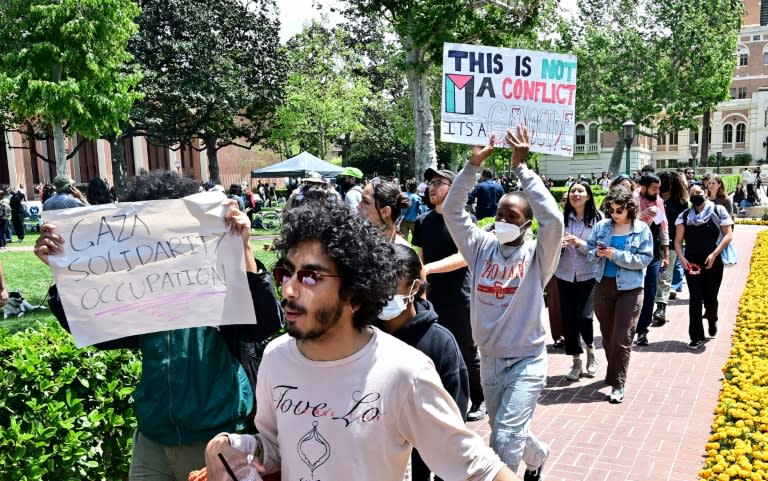Pro-Palestinian US campus protests grow as police crack down

Pro-Palestinian protests spread to more college campuses in the United States on Thursday as authorities appeared to be running out of patience and police began to push back forcefully.
Riot officers used chemical irritants and tasers at one university as administrators at some of the country's most prestigious institutions battled to prevent occupations taking hold.
New sit-ins and boisterous demonstrations sprang up at campuses across the United States, with activists calling for a ceasefire in Israel's war with Hamas, as well as for colleges to sever ties with the country and with companies they say profit from the conflict.
"For 201 days, the world has watched in silence as Israel has murdered over 30,000 Palestinians," said a message posted online by organizers of a new protest at the University of California, Los Angeles.
"Today, UCLA joins students across the country in demanding that our universities divest from the companies which profit off of the occupation, apartheid and genocide in Palestine."
More than 200 protesters were arrested Wednesday and early Thursday at universities in Los Angeles, Boston and Austin, Texas, where around 2,000 people gathered again on Thursday.
At Emory College in Atlanta, photographs showed police wielding tasers as they wrestled with protesters on neatly manicured lawns.
Officers wearing gas masks used zip-ties to detain people, the college's Emory Wheel news website reported.
The Atlanta Police Department (APD) said the college had asked for help in "securing the campus".
"Law enforcement officers were met with violence," said a statement from the public affairs unit.
"We are aware APD officers used chemical irritants during the incident. However, APD did not deploy rubber bullets."
The spreading protests began at Columbia University in New York, where a midnight deadline was approaching for students to remove an encampment that has become the epicenter of the movement.
The protests pose a major challenge to university administrators who are trying to balance campus commitments to free expression with complaints that the rallies have crossed a line.
Pro-Israel supporters and others worried about campus safety have pointed to anti-Semitic incidents and allege that campuses are encouraging intimidation and hate speech.
"I've never felt more scared to be a Jew in America right now," said Skyler Sieradsky, a 21-year-old student of philosophy and political science at George Washington University.
"And not only in America, on campus, when I know that there are students and faculty standing by messages of hate, and standing by messages that call for violence."
Student protesters say they are expressing solidarity with Palestinians in Gaza, where the death toll has topped 34,305, according to the Hamas-run territory's health ministry.
Demonstrators, including a number of Jewish students, have disavowed instances of anti-Semitism and criticized officials equating it with opposition to Israel.
"People (are) here in support of Palestine people from all different backgrounds, people you know, compelled by their own ancestors, their general sense of justice, to be here," a demonstrator at the University of Texas, Austin, who said he was Jewish and gave his name as Josh, told AFP.
US ally Israel launched its war in Gaza after the Hamas attack on October 7 that left around 1,170 people dead, according to an AFP tally of Israeli official figures.
Hamas militants also took roughly 250 people hostage. Israel estimates 129 remain in Gaza, including 34 who are presumed dead.
- Coast to coast -
At the University of Southern California in Los Angeles, where 93 people were arrested for trespassing on Wednesday, authorities said they were cancelling events at the May 10 graduation ceremony.
The ceremony, which usually attracts 65,000 people, made headlines this month when administrators cancelled a planned speech by a high-flying student after complaints from Jewish groups that she had links to anti-Semitic groups.
She denied the charge.
At Emerson College in Boston, local media reported classes were cancelled Thursday after police clashed with protesters overnight, tearing down a pro-Palestinian encampment and arresting 108 people.
In Washington, students from Georgetown and George Washington University (GW) established their own solidarity encampment on the GW campus Thursday, the Georgetown Voice student publication reported, with a walkout planned at Georgetown.
Protests and encampments have also sprung up at New York University and Yale -- both of which also saw dozens of students arrested earlier this week -- Harvard, Brown University, MIT, the University of Michigan and elsewhere.
On Sunday, US President Joe Biden denounced "blatant anti-Semitism" that has "no place on college campuses."
But the White House has also said that the president supports freedom of expression at US universities.
burs-hg/st


